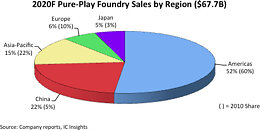
TSMC Fast-Tracks US Fabs, Europe and Japan Fall Behind
TSMC is adjusting its global investment strategy in response to geopolitical pressures and changing market demands. Encouraged by the US government, the world's largest contract chipmaker has moved up completion dates for its Arizona fabrication plants by as much as six months. This shift is designed to address the growing domestic needs in defense, artificial intelligence, and high-performance computing. Originally committed to $65 billion in US manufacturing, TSMC recently increased that total to $165 billion. The expanded plan includes three additional fabs, two advanced packaging facilities, and a research center, all of which are expected to begin operation by 2030. Company executives argue that on-site production will help alleviate supply-chain bottlenecks and reduce cost volatility for American customers, even though chips made in Arizona will carry a premium compared with those produced in Taiwan.
At the same time, TSMC's projects in Japan and Germany have encountered difficulties. In Kumamoto, Fab 1 has not reached its planned utilization levels, and persistent traffic and local infrastructure issues have delayed the start of construction for Fab 2. Some point to labor shortages and conservative order forecasts from automotive and electronics clients as additional factors. In Europe, a slowdown in auto production has weakened demand for semiconductor capacity. TSMC's joint venture with Bosch, Infineon, and NXP in Germany now faces potential delays as partner layoffs and declining sales of combustion engines undermine initial growth expectations. Despite these setbacks, Taiwan remains central to TSMC's operations, hosting nearly half of its nine facilities under construction. For now, TSMC's pause in Japan and Europe appears to be a strategic reallocation of resources to the US, where policy support and urgent demand intersect.
At the same time, TSMC's projects in Japan and Germany have encountered difficulties. In Kumamoto, Fab 1 has not reached its planned utilization levels, and persistent traffic and local infrastructure issues have delayed the start of construction for Fab 2. Some point to labor shortages and conservative order forecasts from automotive and electronics clients as additional factors. In Europe, a slowdown in auto production has weakened demand for semiconductor capacity. TSMC's joint venture with Bosch, Infineon, and NXP in Germany now faces potential delays as partner layoffs and declining sales of combustion engines undermine initial growth expectations. Despite these setbacks, Taiwan remains central to TSMC's operations, hosting nearly half of its nine facilities under construction. For now, TSMC's pause in Japan and Europe appears to be a strategic reallocation of resources to the US, where policy support and urgent demand intersect.













